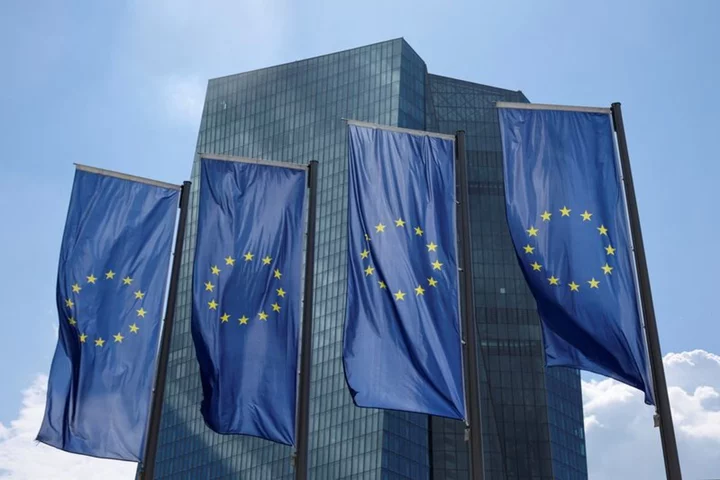By Lefteris Papadimas
ATHENS (Reuters) -The European Central Bank left interest rates unchanged as expected on Thursday, snapping an unprecedented streak of 10 consecutive rate hikes, and maintained its guidance which signals steady policy ahead.
The ECB has lifted rates by a combined 4.5 percentage points since July 2022 to combat runaway price growth but hinted last month that it would pause as record high borrowing costs are starting to work their way through the economy.
Price pressures are finally easing and inflation has more than halved in a year while the economy has slowed so much that a recession may already be under way, boosting market bets that rate hikes are finished and the ECB's next move will be a cut.
Looking to keep all of its options open, the ECB said it would follow a "data-dependent" approach and decisions would be based on incoming data.
"The key ECB interest rates are at levels that, maintained for a sufficiently long duration, will make a substantial contribution to (the inflation) goal," the bank said in a statement after meeting in Athens for the first time in 15 years.
"Future decisions will ensure that its policy rates will be set at sufficiently restrictive levels for as long as necessary," the ECB said.
The decision to keep rates unchanged is likely to reinforce expectations that the world's biggest central banks, including the U.S. Federal Reserve, are essentially done tightening policy, ending an unprecedented series of synchronized rate hikes.
That is likely to shift market focus to just how long rates need to stay at their current highs, a tricky exercise as investors are already betting on the next ECB move to be a cut as soon as June, with two full moves priced in by next October, a timeline some policymakers consider unrealistic.
Another complication is that rising energy costs, given a boost by the new conflict in the Middle East, could keep inflation under pressure just as growth falters. That would herald a damaging period of stagflation, where inflation is high while growth stagnates.
The outlook for the economy appears to be increasingly precarious, putting a so-called "soft landing" in jeopardy.
Industry is in recession, sentiment indicators are pointing south, consumption is muted and even the labour market has started to soften, all suggesting a contraction in the second half of 2023.
With Thursday's decision, the ECB's deposit rate stays at a record high 4% while the main rate stands at 4.5%.
BOND PORTFOLIO REDUCTION?
Attention will now turn to ECB President Christine Lagarde's 1245 GMT news conference.
She is likely to asked whether policymakers discussed an early reduction of bond holdings in the bank's 1.7 trillion euro ($1.8 trillion) Pandemic Emergency Purchase Programme.
The wording of the ECB's statement on PEPP remained unchanged and the bank repeated its promise to reinvest all proceeds from maturing debt through the end of 2024.
However, some policymakers have publicly said that such a commitment is excessively long and the bank should have another think, given that it is now tightening policy.
The complication is that the ECB uses these reinvestments as its "first line of defence" for vulnerable euro zone economies like Italy, because it can adjust its purchases of government bonds to insulate them from undue market volatility.
That suggests that any change in the scheme is not imminent and would in any case be gradual.
($1 = 0.9457 euros)
(Writing by Balazs Koranyi; Additional reporting by Francesco Canepa; Editing by Emelia Sithole-Matarise and Catherine Evans)

